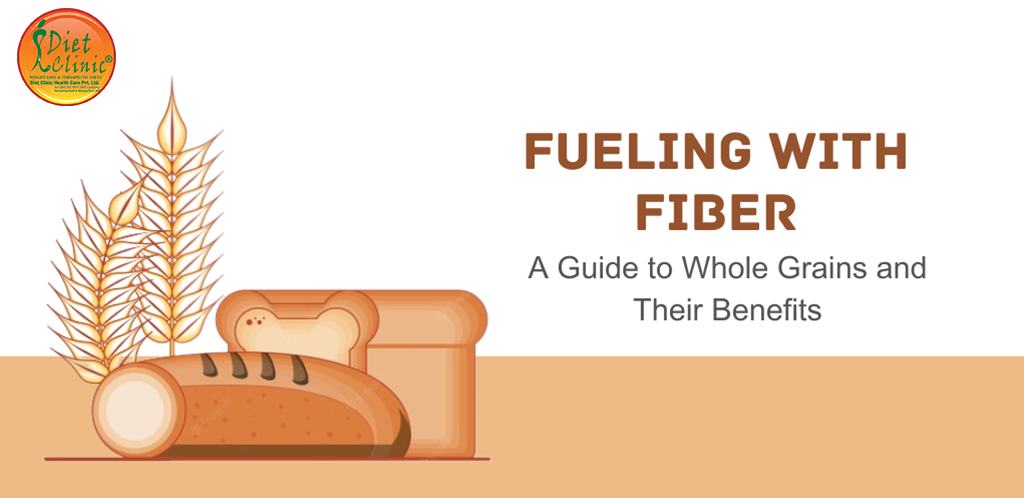
Dietician Sheela Seharawat
Fueling with Fiber: A Guide to Whole Grains and Their Benefits
In the realm of nutrition, the spotlight often falls on macronutrients like protein, fats, and carbohydrates, while the unsung hero, dietary fiber, quietly goes about its business. Yet, dietary fiber is a critical component of a healthy diet, and one of its most abundant sources is whole grains. As a registered dietitian, I'm here to shed light on the many benefits of whole grains and how they can be your secret weapon in achieving optimal health.
Understanding the Basics: What Are Whole Grains?
Whole grains are the unrefined form of grains that include the entire kernel—the bran, germ, and endosperm. This completeness means they retain all the essential nutrients, fiber, and phytochemicals naturally present in the grain. Examples of whole grains include brown rice, quinoa, whole wheat, oats, barley, and farro.
The Benefits of Whole Grains
Rich in Dietary Fiber: Whole grains are an excellent source of dietary fiber, which plays a pivotal role in digestive health. Fiber promotes regular bowel movements, prevents constipation, and reduces the risk of gastrointestinal issues.
Weight Management: High-fiber foods like whole grains can help with weight management by keeping you full and satisfied for longer periods. This reduces the urge to snack on unhealthy options between meals.
Blood Sugar Control: Whole grains have a lower glycemic index compared to refined grains, which means they release glucose into the bloodstream at a slower and steadier rate. This helps regulate blood sugar levels and can be beneficial for individuals with diabetes.
Heart Health: Consuming whole grains is associated with a reduced risk of heart disease. The soluble fiber in whole grains helps lower LDL (bad) cholesterol levels, thereby protecting your cardiovascular health.
Digestive Health: The fiber in whole grains also supports a healthy gut microbiome. A balanced gut microbiome is linked to improved immunity and a reduced risk of chronic diseases.
Nutrient Powerhouses: Whole grains are packed with essential vitamins and minerals, including B vitamins (thiamin, niacin, and folate), magnesium, and iron. These nutrients are crucial for overall health and well-being.
Antioxidants: Whole grains contain a variety of antioxidants, such as phenolic compounds, which help protect your cells from oxidative damage and inflammation.
Reduced Risk of Certain Cancers: Regular consumption of whole grains has been associated with a lower risk of certain cancers, including colorectal cancer.
Improved Longevity: Studies have shown that people who incorporate whole grains into their diets tend to live longer and enjoy a higher quality of life in their later years.
Incorporating Whole Grains into Your Diet
Now that we've established the incredible benefits of whole grains, let's explore practical ways to incorporate them into your daily meals:
Start Your Day Right: Swap out refined cereals for whole grain options like oatmeal or whole grain muesli. Top them with fresh fruits, nuts, and a drizzle of honey for added flavor and nutrition.
Whole Grain Bread: Opt for whole grain or whole wheat bread for your sandwiches and toast. Look for labels that list "100% whole wheat" or "100% whole grain" to ensure you're getting the real deal.
Brown Rice: Replace white rice with brown rice in your meals. It has a nuttier flavor and a chewier texture, making it a delicious and nutritious alternative.
Quinoa: Experiment with quinoa, a complete protein source among grains. It's versatile and can be used as a base for salads, stir-fries, or as a side dish.
Whole Wheat Pasta: If pasta is a favorite in your household, make the switch to whole wheat pasta for a boost in fiber content.
Snack Smartly: Choose whole grain snacks like popcorn, whole grain crackers, or air-popped whole grain chips for a healthier option when the munchies strike.
Experiment with Ancient Grains: Don't limit yourself to just wheat-based grains. Try ancient grains like farro, spelt, or barley for unique flavors and textures.
Bulk Up Soups and Stews: Add whole grains like barley or bulgur to soups and stews to make them heartier and more nutritious.
Baking Adventures: When baking, substitute some or all of the white flour with whole wheat flour or other whole grain flours to increase the fiber content of your baked goods
.Potential Pitfalls to Avoid While whole grains offer numerous health benefits, it's important to be mindful of a few potential pitfalls:
Portion Control: Whole grains are nutritious, but they are calorie-dense. Be mindful of portion sizes to avoid excess calorie intake.
Hidden Sugars: Some packaged whole grain products may contain added sugars, so always check labels for hidden sugars.
Processing Matters: Processing can strip some of the nutrients from whole grains. Choose minimally processed or whole grains over refined and highly processed versions.
Gluten Sensitivity: If you have celiac disease or gluten sensitivity, be cautious and choose gluten-free whole grains like quinoa, brown rice, and oats.
Balanced Diet: Remember that while whole grains are an essential part of a balanced diet, they should be combined with other food groups like fruits, vegetables, lean proteins, and healthy fats.
Whole grains are an unsung hero of nutrition, offering a plethora of health benefits that are often overlooked. By incorporating whole grains into your daily diet, you can support your digestive health, maintain a healthy weight, and reduce the risk of chronic diseases. So, let whole grains become your nutritional ally on the journey to better health, one delicious meal at a time.


.png)







